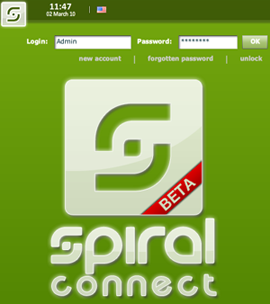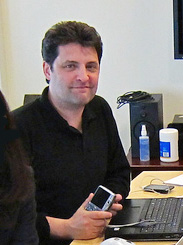SPIRAL Connect is a comprehensive learning management platform currently being piloted in University Lyon 1 in Lyon France. Christophe Batier's presentation here at MIT last Friday sparked a lively dialogue focussing on SPIRAL's impact on teaching and learning at the university level.
As IS&T's Joanna Proulx pointed out, with the ubiquity of YouTube, Facebook and other social networking tools, students are comfortable with expressing themselves through many digital modalities. But having the capability to communicate digitally with one's professor and fellow students was a new experience for french undergraduates. And, according to Batier, it was met with success and enthusiasm, demonstrated by greater participation in and engagement with the learning experience.

Because SPIRAL Connect is an integrated web platform it supports a diverse set of media inputs: from video, to audio, to blogs, to forums, and encompassing virtually any format or file-type currently in use. Students create their own account or profile, which then allows them to participate in only the courses and activities that they are interested in. SPIRAL becomes a customized environment tailored to their specific education plan.
With SPIRAL's integration into facebook, students' personal pages can also become the portal through which they access SPIRAL, thus adding greater integration between the personal and the educational.
 Batier's hierarchy of web engagement served as an interesting springboard for contemplating where web 2.0 technologies may be heading. He referred to web 1.0 as the 'he' era, where interacting with the web was essentially a one-way transaction. From that he described the evolution to the 'we' era of web 2.0, where the web becomes a two-way, multidimensional interactive environment. He then described the next generation as the 'me' era, where web 3.0 becomes a user-centered, user-focussed experience, as each individual interacts with the web in unique and personal ways.
Batier's hierarchy of web engagement served as an interesting springboard for contemplating where web 2.0 technologies may be heading. He referred to web 1.0 as the 'he' era, where interacting with the web was essentially a one-way transaction. From that he described the evolution to the 'we' era of web 2.0, where the web becomes a two-way, multidimensional interactive environment. He then described the next generation as the 'me' era, where web 3.0 becomes a user-centered, user-focussed experience, as each individual interacts with the web in unique and personal ways.
Cec d'Oliveira of OCW brought up timely questions regarding intellectual property, since much of the student work shown in Batier's presentation contained re-purposed commercial material. Apparently SPIRAL has a full featured security system with granular permissions, thus limiting access to material on a course by course basis. Batier also suggested that copyright standards in France may be less strict than the US at this moment.
OEIT's Jeff Merriman and Peter Wilkins will be further investigating SPIRAL's Connect, with the possibility of prototyping it with interested faculty later this year or next fall.